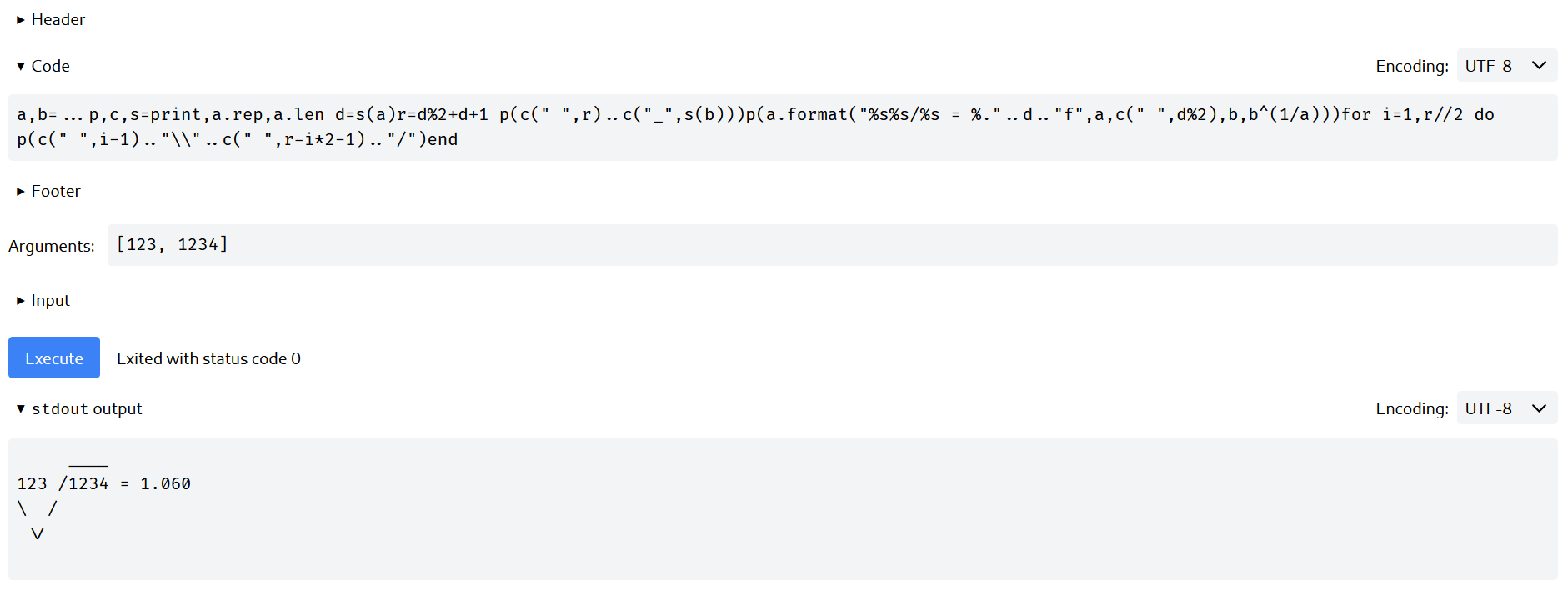Challenge:
Given two integers \$a\$ and \$b\$, with lengths \$A=length(a), B=length(b)\$, output an ASCII-art of the \$a^{th}\$ root of \$b\$, including the answer rounded to \$A\$ amount of decimal places.
The size of the ASCII-art root also depends on \$A\$ and \$B\$.
Example:
\$a=123\$, \$b=1234\$
____
123 /1234 = 1.060
\ /
\/
Because \$B=4\$, we have four _ above the 1234. Because \$A=3\$, we have three† / and \$1.0595772951...\$ is rounded to 1.060.
†: This will not be equal to \$A\$, but \$\left\lceil{\frac{A}{2}}\right\rceil+1\$ instead.
Challenge rules:
- I/O format is flexible:
- You're allowed to take the input loose or as a pair of integers; doubles; strings; list of digits; etc.
- You're allowed to print the result directly to STDOUT; return it as a string; return it as a list/array/stream of string-lines; return it as a matrix of characters; etc.
- If input \$a\$ has an odd length \$A\$, the number is left-aligned in the output. So in the example above you're not allowed to have the second line as
123/1234 = 1.060! (It should be123<space>/...instead of<space>123/...) - The
=in the output should be surrounded by a single leading/trailing space - Rounding can be done in any reasonable way (e.g. rounding towards 0, half-up, half-even, banker's rounding, etc.)
- If the rounded result ends with
0s, you're allowed to omit them. (E.g., the1.060in the example above may also be1.06.) - You can assume \$a>0\$ and \$b\geq0\$ (\$a\$ is positive, \$b\$ is non-negative).
- Trailing spaces in the output, and a single trailing newline is fine. Multiple trailing newlines or trailing whitespaces are not.
General rules:
- This is code-golf, so the shortest answer in bytes wins.
Don't let code-golf languages discourage you from posting answers with non-codegolfing languages. Try to come up with an as short as possible answer for 'any' programming language. - Standard rules apply for your answer with default I/O rules, so you are allowed to use STDIN/STDOUT, functions/method with the proper parameters and return-type, full programs. Your call.
- Default Loopholes are forbidden.
- If possible, please add a link with a test for your code (e.g. TIO).
- Also, adding an explanation for your answer is highly recommended.
Test cases:
Inputs: a=3, b=100 (A=1, B=3)
___
3 /100 = 4.6
\/
Inputs: a=123, b=1234 (A=3, B=4)
____
123 /1234 = 1.060
\ /
\/
Inputs: a=10, b=10 (A=2, B=2)
__
10/10 = 1.26
\/
Inputs: a=1298123, b=9023847978341 (A=7, B=13)
_____________
1298123 /9023847978341 = 1.0000230
\ /
\ /
\ /
\/
Inputs: a=2500, b=0 (A=4, B=1)
_
2500/0 = 0.0000
\ /
\/

